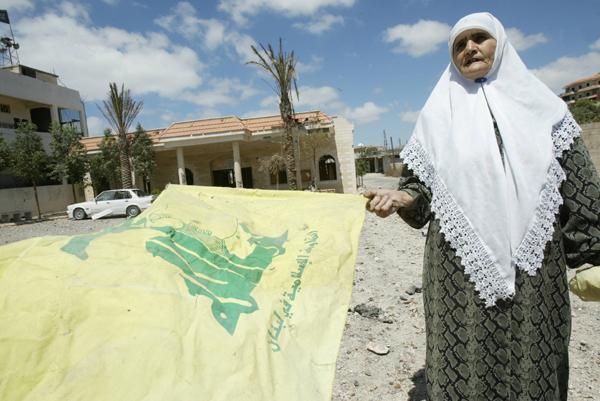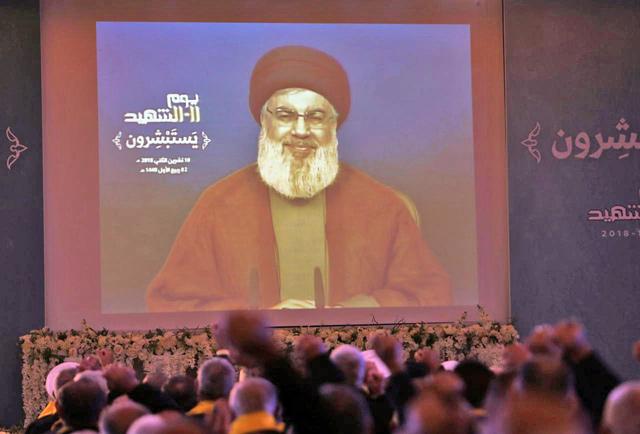You are here
Decade after war, Israel’s ‘main enemy’ Hizbollah mired in Syria
By AFP - Jul 11,2016 - Last updated at Jul 11,2016

This file photo taken on August 14, 2006 shows a Shiite Muslim villager holding a Hizbollah flag in the heavily damaged southern Lebanese village of Yater, where an Israeli helicopter was shot down by Hizbollah two days earlier (AFP photo)
OCCUPIED JERUSALEM — Israel this week marks a decade since its 2006 war with its “main enemy” Hizbollah, but the Lebanese militia’s involvement in Syria has made another conflict less likely for now.
The war sparked by Hizbollah’s capture of two Israeli soldiers on July 12, 2006 is viewed negatively in Israel, with analysts saying there was a lack of a clear strategy.
Chief of Staff Gadi Eisenkot, who was head of operations at the time, posted an open letter on Sunday paying tribute to the troops involved, and also saying lessons had been learned.
“The threat from Lebanon still exists and contains many challenges, and necessitates the [Israeli military] to be prepared for any scenario,” Eisenkot wrote.
Earlier this year, he described the Iran-backed Hizbollah as Israel’s main enemy, and deputy chief of staff Yair Golan said in April that the Shiite militia’s improved capabilities were worrying.
Golan also warned that in any future crisis “it’s going to be full-scale war”.
He said that because of the presence of Hizbollah fighters in civilian areas, “there is no other way to take out this threat without really creating large damage to the Lebanese infrastructure, to Lebanese houses and other civilian facilities”.
Israel’s military believes Hizbollah has between 100,000 and 120,000 short- and medium-range missiles and rockets, as well as several hundred long-range missiles, with the medium-range missiles capable of reaching Tel Aviv.
Objectives not met
But now the group’s focus is on the war in Syria where it is fighting in support of President Bashar Assad.
It has sent thousands of fighters to help regime forces battle rebels and terrorists.
“For now, Hizbollah’s attention is on Syria,” said Phillip Smyth, an adjunct fellow at the Washington Institute for Near East Policy.
“It’s hard for them to open another front against a markedly superior foe like the Israelis, especially as they have to deal with fighting a multitude of foes across Syria.”
Amid the chaos in Syria, Israel has also acknowledged attacking dozens of convoys there that were transporting weapons destined for Hizbollah.
Israel occupied parts of Lebanon for 22 years until 2000, with Hizbollah claiming credit for its withdrawal following persistent guerrilla attacks, and the two countries are still technically at war.
The 34-day conflict in 2006 led to the deaths of 1,200 people in Lebanon, mainly civilians, and 160 Israelis, mostly soldiers.
It began when Israel retaliated over a cross-border raid in which Hizbollah captured two Israeli soldiers and killed three, and quickly spiralled into a fully fledged war.
Hizbollah fired thousands of rockets into northern Israel, which carried out devastating strikes across Lebanon.
Many people in Israel considered the massive ground and air war on Lebanon to be a failure because it did not halt Hizbollah rocket fire or recover the two captured soldiers.
Serious missed opportunity
Their bodies were returned two years later in exchange for the release of five Lebanese prisoners.
Then prime minister Ehud Olmert and military leaders at the time faced heavy criticism.
A key government report on the war called it a “serious missed opportunity” for Israel, saying there was a lack of planning and no clear exit strategy.
The so-called Winograd report highlighted the controversial ground offensive launched in the final days of the war, while the United Nations was brokering a ceasefire agreement, saying it did not achieve its objectives.
“I think it’s still viewed as a blemish on the IDF for not being prepared for it,” said Efraim Inbar, director of Israel’s Begin-Sadat Centre for Strategic Studies, referring to the Israeli military.
“A lot of confusion at the highest echelons in the military. And also the political strategic leadership failed,” he told AFP.
But as the years have passed, some in Israel have adopted a more forgiving view, noting the relative quiet along the Lebanese border even before the Syrian war began in 2011 and drew in Hizbollah, said Jonathan Spyer, director of Israel’s Rubin Centre for international affairs research.
There are concerns, however, over whether Hizbollah could benefit from its fighting experience in Syria, becoming more battle-hardened and knowledgeable after having fought on the same side as Russia, which also backs Assad.
Spyer said the likelihood of another conflict with Hizbollah was low until the Syrian war ends.
But he also noted that “Hizbollah remains committed to the destruction of Israel” and that the militia is “much stronger now than it was back in 2006”.
Related Articles
OCCUPIED JERUSALEM — The head of Israel’s air force said on Wednesday that in any future conflict with Lebanon the Jewish state will have “u
BEIRUT — The chief of Lebanon’s Hizbollah movement has warned Israel against continuing strikes in Syria, targeting mainly Iranian posi
Hizbollah on Wednesday threatened to retaliate after Israel’s first reported air raid targeting a position of the Lebanese Shiite movement since a 2006 war.

















